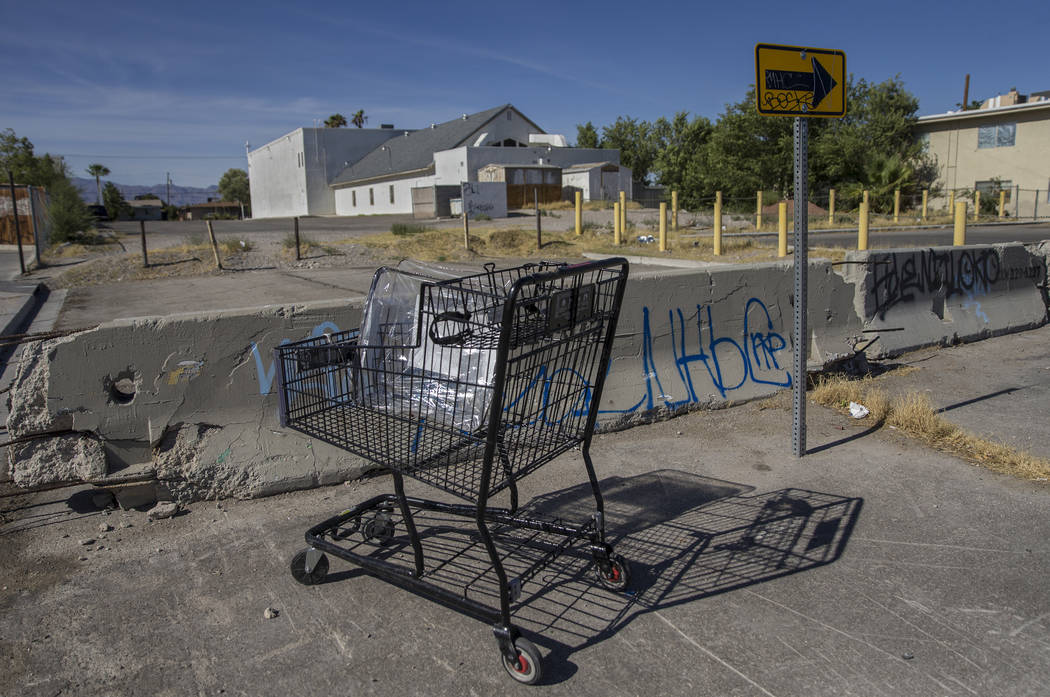Las Vegas OKs 5 percent trash surcharge to counter problem

Las Vegas residents will pay about $9 more per year for trash and recycling under a 5 percent increase approved Wednesday by the City Council to boost funding for environmental programs meant to curtail a mounting trash problem throughout the city.
An anticipated $4 million in new yearly revenue will be collected in a special fund to address an escalating amount of debris unrelated to the trash picked up from neighborhood curbs, according to Karen Duddlesten, the city’s chief community services officer.
In the past decade, dumping in public spaces — streets, vacant lots, parks and alleyways — has climbed so quickly, city officials warn it is a public health issue that cannot be ignored. When the debris ends up in storm drains, it may threaten the water supply.
Councilman Cedric Crear said the council must act or risk infectious disease outbreaks. “If we do not, believe me, we will have outbreaks.”
To illustrate the growing issue, Duddlesten said city staff removed roughly 300 tons of debris in 2009. In the last fiscal year, the figure had climbed to about 3,000 tons.
“So the rate at which this is increasing over the past 10 years is of great concern,” she said.
The influx is also reflected in employee time spent addressing the problem: From a decade ago to today, staff hours ballooned from 3,000 to 28,000, she said, with an additional $250,000 cost for materials and contractors.
The issue is spread throughout the city, Duddlesten said.
In a 6-1 vote, the council approved implementing the environmental surcharge on all billings for trash collection and residential recycling services. It will be collected by Republic Silver State Disposal and passed on to the city, beginning Oct. 1.
Such a surcharge is allowed in the 15-year franchise agreement between the city and the company that was signed two years ago, officials said.
Only Councilman Stavros Anthony opposed the proposal, saying the money wouldn’t improve trash or recycling collection. He also called the resolution’s language unclear and said constituents should first be formally notified of the new charge.
Customers can expect an increase of $2.28 per quarter on average, Duddlesten said.
Where will the money go?
The city expects to collect roughly $3 million of new revenue in fiscal 2020, since the surcharge will only cover nine months. The annual funding is estimated to reach $4 million beginning in fiscal 2021, according to Duddlesten.
While the revenue is restricted to a special fund and earmarked toward “environmental programs” benefiting public welfare, the City Council’s discretion on using the money appears broad.
Duddlesten offered some examples: cleanups, security upgrades to public parks and storm water infrastructure, as well as the city’s Courtyard Homeless Resource Center — specifically sanitation and enhanced services to reduce homeless encampments.
While homelessness was not explicitly identified as a cause of debris, there were such suggestions.
“This is a temporary solution to cleaning up some really hard issues within our community,” Councilman Brian Knudsen said. “And my hope is that, as a city, we spend quite a bit more time looking at systemic issues and challenges that plague our community that result in homelessness.”
The surcharge is reminiscent of the city’s failed effort to get the Nevada Legislature to approve a bill in the 2019 session to apply a sewer surcharge to generate about $5 million annually for homelessness programs.
But city spokesman Jace Radke, when asked why the city didn’t first pursue the current plan, noted the two were distinct: The original version of Assembly Bill 73 involved allowing the city to impose a new sewer surcharge, while the resolution approved Wednesday applies to the existing franchise agreement for trash pickup.
Contact Shea Johnson at sjohnson@reviewjournal.com or 702-383-0272. Follow @Shea_LVRJ on Twitter.